How to Help Kids with ADHD Be More Independent | Ryan Wexelblatt, LCSW, ADHD Dude

Mornings can feel like déjà vu.
You say the same things every day: Shoes. Lunch. Water bottle.
Your child tunes out, and you’re left wondering, Will they ever manage on their own?
Many parents of kids with ADHD repeat reminders out of love and concern. The goal is to keep things moving and avoid stress. But when this becomes routine, you may unknowingly take over your child’s executive functioning instead of helping them build it.
Kids with ADHD often develop prompt dependence when parents step in too often. Building executive function skills helps them learn to manage independently.
What Is Prompt Dependence in Kids with ADHD?
Prompt dependence happens when children rely on constant reminders to get through daily routines. They depend on your voice to start and finish tasks, which limits their ability to plan, organize, and follow through on their own.
Over time, this can make it harder for them to grow into confident, independent teens and young adults.
How to Help Your Child Move from Prompt Dependence to Independence
Helping your child become more independent means teaching them to think for themselves instead of thinking for them. This starts with strengthening two key executive function skills that kids with ADHD often struggle with.
1. Strengthen Nonverbal Working Memory (Future Thinking Skills)
Nonverbal working memory allows your child to picture themselves doing something in the future.
For example, a child might finish homework but forget to turn it in. That’s not carelessness, it’s a sign they didn’t visualize that next step. They might also leave belongings at a friend’s house because they didn’t mentally picture packing them up again.
Parent Tip: Help your child build this “future thinking” ability by encouraging them to visualize what comes next in a routine.
2. Strengthen Internal Dialogue (The “Brain Voice”)
Internal dialogue is the quiet self-talk we use to guide our actions. It’s what reminds you to grab your keys or put your dishes away.
Kids with ADHD often use this brain voice inconsistently. Without it, they struggle to move through routines on their own and rely on your verbal prompts instead.
Parent Tip: You can strengthen your child’s internal dialogue by changing how you communicate in daily situations.
How to Use Declarative Language with Kids Who Have ADHD
One of the simplest ways to support independence is by changing how you speak to your child.
Instead of giving direct commands, try declarative language that invites your child to think and act for themselves.
Example:
Instead of saying, “Get your water bottle,” try saying,
“Look around the kitchen and see if you’re ready to leave for school.”
This phrasing helps your child interpret, think, and make decisions. It engages their internal dialogue and encourages ownership of the next step.
It may take more effort at first, but over time, your child learns to guide themselves rather than just react to instructions.
Why Checklists and Timers Aren’t Enough
Checklists, timers, and visual schedules are helpful short-term tools, but they don’t build independence by themselves.
These strategies support external organization, not internal growth.
True independence comes from developing the executive function skills that allow your child to plan, self-direct, and follow through without reminders.
Many parents find this shift harder than expected. It can take patience, consistency, and a willingness to let go of old habit; something I explored from my own experience.
What Happens When Prompt Dependence Continues
When prompt dependence continues into adolescence, many kids struggle later when the structure of home and school disappears.
Teens with ADHD often hit a wall after leaving home, not because of academics, but because they were never taught how to manage daily life without constant reminders.
The good news is it’s never too late to start building these skills. The earlier you begin, the more confident and capable your child becomes; in school, relationships, and life.
Building Confidence Through Capability
Confidence doesn’t come from praise; it comes from capability.
When kids with ADHD learn to think ahead and manage their routines independently, they begin to feel proud of what they can do.
That’s where real confidence begins; when your child realizes, I can do this myself.
If this feels familiar, you don’t have to figure it out alone.
Inside the ADHD Dude Membership, you’ll find step-by-step strategies to strengthen your child’s executive function skills so they can become more independent and confident in daily life.
You’ll learn how to:
-
Strengthen future thinking and internal dialogue
-
Use declarative language effectively
-
Support your child in building self-management and follow-through
For families ready to take these ideas even further, Capable & Confident (ages 4–7) offers a practical roadmap to help your child develop independence, accountability, and self-assurance in everyday life.
Learn more about both Executive Function Crash Course (ages 8–17) and Capable & Confident (ages 4–7) inside the ADHD Dude Membership.
FAQ:
Q: What causes prompt dependence in kids with ADHD?
A: Prompt dependence develops when parents provide too many reminders, which prevents kids from developing internal self-guidance skills. Over time, they rely on external prompts instead of learning to manage their own routines.
Q: How can I help my child with ADHD become more independent?
A: Focus on building executive function skills such as future thinking and internal dialogue. These help your child plan ahead, self-monitor, and follow through without needing constant reminders.
Q: What is declarative language and how does it help kids with ADHD?
A: Declarative language is phrased as an observation or prompt for thinking instead of a command. It encourages your child to interpret your words, make decisions, and take responsibility for the next step.
Q: Why don’t checklists and timers create lasting independence?
A: Checklists and timers help kids get through the moment, but they don’t strengthen the mental skills that create long-term independence. Real growth happens when kids build internal self-talk and future thinking.
Q: What age should I start teaching executive function skills?
A: It’s never too early or too late. Younger kids benefit from consistent modeling and small steps, while older kids and teens can make meaningful progress once they begin practicing these skills intentionally.











